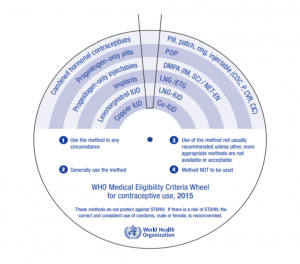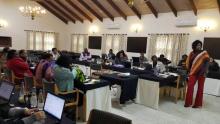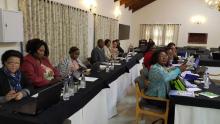Increased access to quality family planning services is key to the health of adolescent girls and young women
Partners in Namibia meet to adapt WHO Global Medical Eligibility Wheel (MET) for contraceptive use into national guidelines. The promotion of family planning and ensuring access to preferred contraceptive methods for women and couples is essential to securing the well-being and autonomy of women, while supporting the health and development of communities. A woman’s ability to choose if and when to become pregnant has a direct impact on her health and well-being.
According to the Namibian Demographic Health Survey (NDHS) of 2013, 27 percent of men aged 15- 24 had sex before age 15 years and 9 percent for women in the same age category. In both instances this is far from the national target of reducing to 14 percent for men by 2014 and to 6 percent by 2013 for women.
NDHS 2013 further reports that ‘the use of modern contraceptive methods among all women increases with age, from 24 percent among those aged 15-19 years to 62 percent among those aged 25-29 years, before gradually falling to a low of 45 percent among women aged 45-49 years.’ The national average for contraceptive use for women of reproductive age is 50 percent. Twelve (12) percent of women of reproductive age have an unmet need for family planning. Spacing of children seems to be a challenge with 14 percent of children being born in less than 24 months intervals for women under age 30.
Namibia has one of the highest rates of teenage pregnancy at 19 percent. Kunene has the highest proportion of teenage pregnancy in Namibia (39 percent), followed by Omaheke (36 percent). Teenage pregnancy is more than three times higher among young women in the lowest wealth quintile than among those in the highest wealth quintile.
In order to increase access and provide quality family planning services, family planning program needs to be strengthened by adopting latest and evidence-based guidelines on safety and service delivery of contraceptive methods, and capacity building of service providers. In this regards, WHO has updated the Medical Eligibility Criteria (MEC) Guideline and the Wheel in 2015 and updated FP Selected Practice Recommendations for contraceptive use (SPR) and Hormonal Contraceptive and HIV (HC/HIV) Recommendations in 2016.
The Ministry of Health and Social Services with financial support from UNFPA and technical support from WHO, conducted a national workshop to incorporate the updated WHO MEC Wheel and family planning recommendations in the national Family Planning guidelines and job aids.
The workshop was attended by 23 participants from MoHSS at national and regional level as well as other partners from Center for Disease Control, Namibia Planned Parenthood Association, Intrahealth, International University of Management; National Health Training Centre, University of Namibia.
Dr Nancy Kidula from WHO Inter Country Support Team facilitated the workshop.





